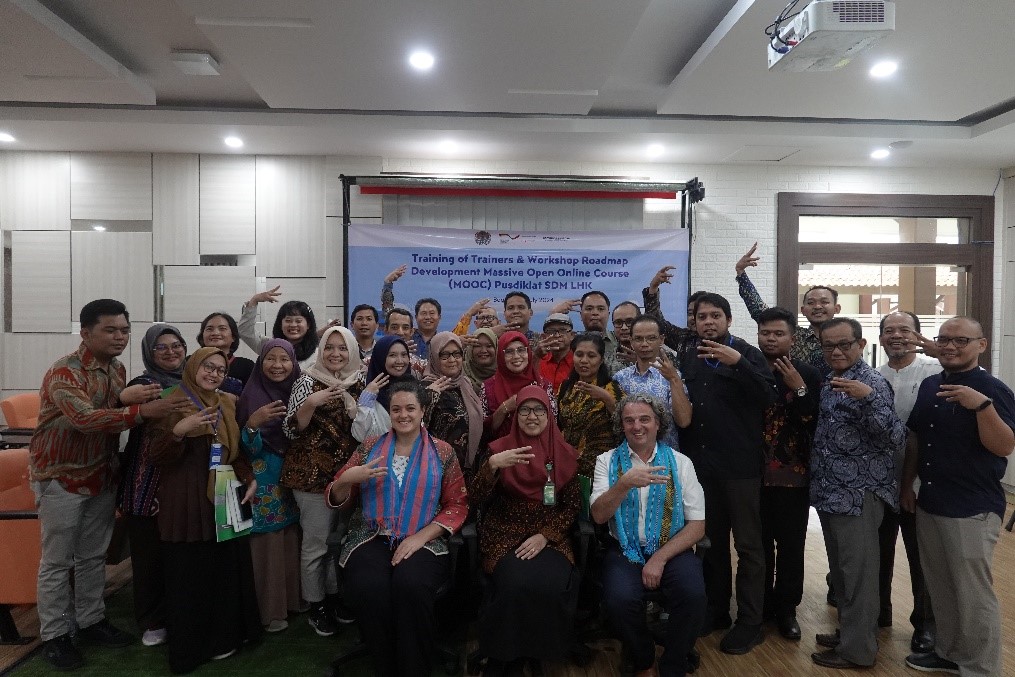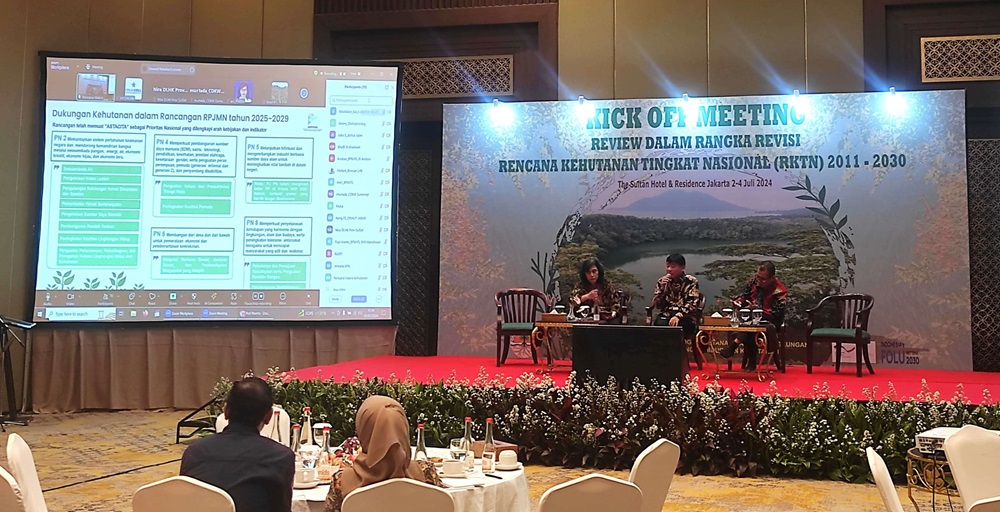FORCLIME
Forests and Climate Change ProgrammeTechnical Cooperation (TC Module)

Select your language
The Environment and Forestry Human Resource Education and Training Center, working in conjunction with GIZ and Common Sense, completed work on a Massive Open Online Course (MOOC) readiness assessment study in March 2024. Based on the results of this assessment, the following proposals have been made for future activities: 1) Implementation of Training of Trainers (ToT) for MOOC, and 2) Development of a roadmap for the implementation of MOOC with stakeholders.
In line with the second goal, i.e. development of a roadmap for the implementation of MOOC, the Environment and Forestry HR Training Center, supported by FORCLIME and Common Sense, held a hybrid FGD from 3 – 4 July 2024. These discussions were held to solicit opinions from various parties working at the Ministry of Environment and Forestry, including the Environment and Forestry HR Training Center and the Regional Community Forestry Training Center for Asia and the Pacific (RECOFTC), regarding a plan of action for future MOOC development that will specifically address policy, infrastructure, human resources and the development of MOOC modules.
"Results of this FGD is very important and will hopefully contribute to the macro planning of environmental and forestry human resource competency development activities," explained the Head of the Environmental and Forestry HR Training Center, Dr. Kusdamayanti.
The results of the FGD will be documented in a report, which will subsequently be used as an action plan/road map recommendation and integrated into the MOOC SOP that is currently being developed at the Environment and Forestry HR Training Center.
For more information, please contact:
Danan P. Hadi, Adviser for Remote Sensing/GIS and eLearning
Edy Marbyanto, Strategic Area Manager for Human Capacity Development

The Environment and Forestry HR Training Center (EF HR Training Center) held a series of training of trainers (ToT) sessions as part of the development of a Massive Open Online Course (MOOC) from 1 – 5 July 2024. The ToT sessions were held in a hybrid manner and represented a continuation of the independent learning (self-study) sessions that were carried out last June. The overall aim of these training sessions was for the participants to be able to design and implement an effective MOOC by applying the principles of adult learning (andragogy). Online training is aimed at the provision of basic knowledge related to eLearning, basic instructional design and media production through digital learning. Meanwhile, face-to-face training involves a participant focus on the design of MOOC training and encompasses discussions, exercises and peer feedback. The training sessions were opened by the Head of the Environmental Human Resources Training Center, Dr. Kusdamayanti, and were attended by 25 participant Widyaiswara (lecturers) and Learning Management System (LMS) administrators drawn from the EF HR Training Center, as well as several EF Training Centers. The training sessions were held in collaboration with the Environment and Forestry HR Training Center, FORCLIME and Common Sense, a consulting institution that has experience in the development of digital learning capacity and the creation of learning content.
FORCLIME supports the development of MOOCs at the LHK HR Education and Training Center through collaboration with Common Sense. This collaboration aims to support the implementation of MOOC development as a more massive eLearning learning concept at the Ministry of Environment and Forestry.
During the face-to-face training sessions, the participants discussed three MOOC training modules that are currently being prepared by the LHK HR Education and Training Center, specifically:
1. Carbon Economic Value.
2. Civil Servant Core Value.
3. Official Correspondence/Records and Management.
In the wake of these ToT sessions, the Environmental and Forestry HR Training Center will continue its work through the organization of the following activities:
• Online Coaching Sessions that will assist participants in the development of MOOC modules (planned for August/September).
• Improved Learning Management System (LMS) that will support MOOC development (also planned for August/September).
For more information, please contact:
Naufal Abdillah, Junior Adviser for Human Capacity Development
Danan P. Hadi, Adviser for Remote Sensing/GIS and eLearning
Edy Marbyanto, Strategic Area Manager for Human Capacity Development

The Ministry of Environment and Forestry has started work on revising the National Forestry Plan (RKTN) 2011 - 2030. This revision is seen as essential to ensuring that the plan remains relevant, effective and in line with current national priorities and international commitments. Based on existing regulations, the Forestry Plan must be evaluated during its implementation in order to measure the effectiveness and efficiency of the plan’s various established activities. These evaluations are carried out at least once every five years, while the revision process involves comprehensive evaluations of the current plan. The evaluations take account of any changes that have been made to regulations, policies and performance over the past five years in order to provide a roadmap for sustainable forestry development within Indonesia until 2030.
In line with these goals, the Directorate-General of Forestry Planning and Environmental Management (DG PKTL) MoEF, supported by FOLU Net Sink’s 2023 Project and FORCLIME, organized a two-day meeting that was held from 2 – 4 July 2024 in Jakarta. The purpose of the event was to coordinate and harmonize plans with stakeholders operating within the forestry sector, as well as to discuss directions, policies, strategies and targets for forest management and forestry administration. The goal was to gather input from relevant parties in order to provide inputs for the revision of the RKTN for the 2011 – 2030 period.
As a follow-up to this meeting, the DG PKTL will organize a series of FGDs in order to further refine its plans that will be held with relevant stakeholders and experts in order to ensure the document's accuracy, relevance and alignment with current forestry management objectives and policies.
For more information, please contact:
Fadhilatunnisa Nurhadiza, Junior Adviser for Sustainable Forest Management
Mohammad Rayan, Technical Adviser for Cross-Cutting Issues and Conflict Management
Wandojo Siswanto, Strategic Area Manager for Forest Policy and Climate Change
 |
Supported By: |
  |